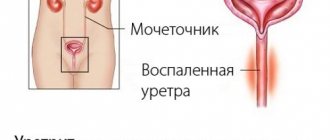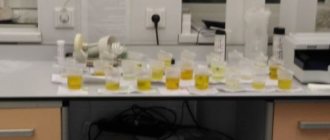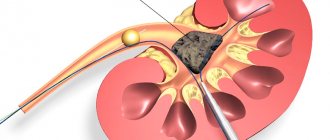- frequent urge to urinate,
- pain and burning in the lower abdomen,
- discomfort when emptying the bladder, manifested by pain and burning,
- frequent urge to go to the toilet during sleep (nocturia),
- increase in body temperature up to 39˚C, general weakness,
- discharge in urine: blood, pus.
It is worth noting that the volume of urine excreted during one visit to the toilet is significantly reduced due to inflammation of the bladder mucosa.
Also, the urine acquires sediment, an unpleasant odor and may change color depending on the causative agent of the disease. If blood clots are noticeable in the urine, this is not a good sign and indicates vascular damage. This causes urine to enter the bloodstream, which can lead to more serious illnesses. Symptoms of the presence of defloration type cystitis do not make themselves felt immediately, but after a few days. Moreover, after its appearance, the symptoms may subside - in this case, treatment cannot be delayed, since the disease still has not disappeared.
What is this?
Defloration cystitis is one of the fairly common diseases of the genitourinary system. Most often it is observed in women and is also called “honeymoon” cystitis . In most cases, it develops due to the penetration of pathogenic microorganisms after rupture of the hymen. In addition, it is often diagnosed in women who are unable to obtain sufficient arousal before sex. It can occur in a variety of forms.
Causes
Doctors say that the main reason why this form of cystitis begins to develop is the entry of various pathogenic microorganisms into the urethra, which occurs when the virgin membrane ruptures. However, in addition to this, there are a number of factors that contribute to the development of pathology of the genitourinary system:
- During sexual intercourse, pathological changes occur inside the bladder, which are the result of specific features of the anatomy of the female body.
- Quite passionate sex, during which the walls of the urethra can be damaged.
- This disease most often affects women whose urethra is located too low - when the penis penetrates, pathogenic microorganisms “move” from the anal area directly into the urethra, causing an inflammatory process.
- According to many doctors, defloration cystitis can be caused by a simple failure to comply with personal hygiene rules.
- The development of all kinds of gynecological disorders occurring in the genitourinary system.
- One of the rarest factors is having oral sex. This reason is argued by the fact that there may be chronic infections on the oral mucosa. Infected saliva and weakened immunity often provoke an exacerbation of the pathology.
- The risk of inflammation of the bladder lining increases in women with a prolapsed kidney. In these people, the ureter becomes blocked, preventing the normal flow of urine and leading to infection.
- Frequent change of sexual partners.
- Quite severe hypothermia of the body.
- During menstruation, dangerous microorganisms can also enter the urethra.
- Enduring severe stress.
Prerequisites for the development of defloration cystitis
The problem appears a few days after the integrity of the virgin membrane is damaged. Until the moment of deflowering, a girl’s vagina is “sealed”; it can only be infected from the inside. After defloration, bacteria, which are always present on the genitals even with the most careful hygiene, penetrate inside.
Friction contributes to irritation of the urethra: after strong friction, E. coli quickly moves through the epithelium of the genitourinary tract to the organ, causing inflammation.
The structural features of the female genitourinary system play a cruel joke in this regard: the wide urethra and the close proximity of the vagina and anus open the “entry gate” to the bladder for pathogenic microflora. In women, the external opening of the urethra is quite wide (up to 2 cm in diameter) and relatively short (4 cm), this allows E. coli to quickly and easily move through the urinary tract.
Penetrating into cells, bacterial colonies populate the urinary tract, feeding on iron compounds (extracting them from the biomaterial). The toxins that are produced as a result of their vital activity corrode the surface of the organ and provoke its inflammation. Since sexual intercourse, as a rule, is not the only one, the number of pathogens increases; and along with them, the degree of insemination of the bladder by intestinal flora also increases.
Does cystitis occur in virgins? Of course, only its nature is different, similar to male inflammation of the bladder, which the infection affects from the inside. This complication develops after any infectious disease, even advanced caries.
The defloration type of cystitis, as a test of the intestinal and vaginal flora of the virgin body, appears only after the first sex, which is why it is popularly called “honeymoon disease.”
This form of the disease affects not only yesterday’s virgins, but also women who do not have enough secretion to lubricate the genitals during intimacy, as well as lovers of aggressive sex with rough active frictions. Under favorable conditions (for example, hypothermia, decreased immunity), cystitis will recur.
Each person has his own, unique composition of microflora. During sexual intercourse, some of the man's microorganisms enter the girl's genital tract. Even if these are beneficial bacteria or opportunistic pathogens, vaginal dysbiosis is observed in 35% of women.
The psychologist talks about the psychosomatic causes of cystitis after the wedding night in the video.
Symptoms
The main symptoms of defloration cystitis are exactly the same as those of other forms of this disease:
It should be noted that this disease may not appear immediately after sexual intercourse. Often its symptoms are observed after a few days.
According to the observations of specialists, after a couple of days, the unpleasant and painful sensations gradually subside, but one should not think that the development of cystitis has stopped: it can occur in a passive form, affecting the organs of the genitourinary system.
Treatment methods for cystitis
Cystitis after defloration is treated using the same methods as the traditional one. Since the main cause of the disease is infection, antibacterial drugs are used. To clarify the type of pathogenic microflora and its sensitivity to a group of antibiotics, bacterial culture is carried out.
In this case, choosing antibiotics on your own works like a lottery - it is not a fact that they are suitable specifically for your pathogen. And if the inflammation is caused by a viral or fungal infection, drugs with other capabilities are needed.
Antibiotics and uroseptics
The pharmaceutical market is filled with new generation antibacterial drugs that help cure cystitis in a short course. There are also disposable medications, such as Monural with a prolonged effect. The powder is dissolved in boiled water and drunk at night. By morning, the symptoms of cystitis disappear.
Until the results of bacteriological culture are ready, broad-spectrum antibiotics such as Nolicin, Palin, Unidox Solutab, Rulid, Supraxa, Furamaga are prescribed. They are taken for 7-10 days, depending on the stage of the disease and the condition of the body as a whole. During pregnancy, Flemoxin is prescribed.
Diagnostics
The difficulty in treating this pathology lies in the fact that in the first stages of development, when the genitourinary system can be treated without problems, the symptoms may first appear and then disappear suddenly. And, feeling relief, the person refuses the examination. But after some time, the problem reminds itself, acquiring a completely different, more complex form.
To diagnose defloration cystitis, doctors prescribe an ultrasound of the kidneys , as well as the bladder, cystoscopy and the following laboratory tests:
What examinations need to be performed
Laboratory diagnostics
• General urine analysis. • Nechiporenko's test. • General blood analysis. • Urine culture for flora and sensitivity to antibacterial drugs. • PCR – diagnosis of STDs. • Smear of vaginal discharge for flora.
Instrumental diagnostics
Above: normal picture of the bladder mucosa Below: hyperemic, inflamed, edematous mucosa in acute cystitis
• Ultrasound of the bladder and kidneys. • Ultrasound of the uterus with appendages. • Cystoscopy.
Additional research methods
• Blood for hormones, • Blood glucose, • Colposcopy.
Treatment
If it was possible to make a diagnosis at the initial stage, then therapy is quite easy and without complications. In this case, special drugs are used aimed at destroying bacteria: Monural , Ofloxin , Cycloferon, Fluconazole .
It is also recommended to follow a diet that excludes fried and salty, spicy and sour foods, soda and alcoholic drinks, and to abstain from sexual intercourse for a while. If you follow the recommendations, the disease will subside in about one week.
However, in later stages more complex treatment is required. Along with taking antibiotics, measures are usually taken to strengthen the immune system: a special antibacterial solution is injected into the bladder. Physiotherapy procedures and therapeutic exercises are no less useful.
If the patient’s condition is too advanced, then it is unlikely that it will be possible to do without surgical intervention.
Treatment of pathology
Various groups of drugs are used to treat cystitis, each of which has its own application.
Antibiotics
Treatment of cystitis involves the use of antibiotics. However, only the attending physician can prescribe the most effective drug after receiving test results. The drug is selected taking into account the pathogen that provoked the disease. To eliminate inflammation, Monural is often used once. In more severe cases, repeated administration is required (up to 7 times - according to indications).
Herbal remedies
Medicines in this group are prescribed after a course of antibiotics. Cyston tablets have anti-inflammatory and antibacterial effects on the patient’s body. The drug can also have a diuretic effect. Herbal medicines also include Canephron, Phytolysin, Monurel, etc. Some natural components included in these medicines can cause an allergic reaction.
Painkillers
Drugs in this group are intended to eliminate pain and discomfort. However, most of these medications are not able to eliminate the cause of cystitis. The most popular painkillers include No-shpa and Papaverine. These medications relax blood vessels and smooth muscles, promoting painless outflow of urine. In combination with antibiotics and herbal remedies, painkillers restore urination functions and eliminate swelling of the mucous membrane of the inflamed organ.
Prevention
In order to prevent the development of inflammatory pathology of the mucous membrane of the genitourinary system, experts advise adhering to the following preventive measures:
Defloration cystitis is a rather dangerous disease. Timely seeking help from specialists will help you recover without problems and avoid any complications.











